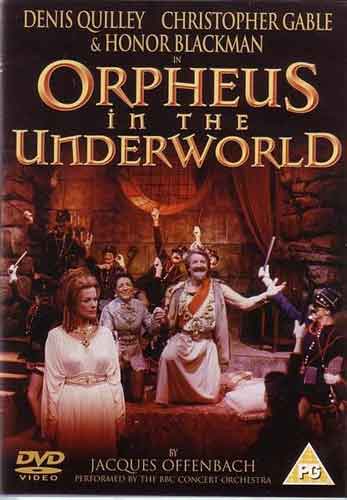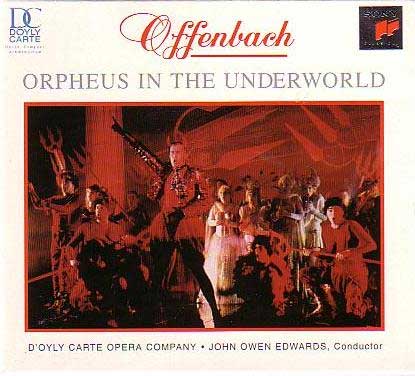.

Orpheus in the Underworld (DVD)
Orpheus in the Underworld (in French: 'Orphée aux enfers') is an operetta in two acts by Jacques Offenbach. The original French text was by Meilhac and Halévy, and the first production took place in Paris in 1858. It is famous for the good plot and the far more famous music. Outside classical circles, the Infernal Galop from Act II, Scene 2 is widely recognized as the music for the "Can-can".
Synopsis
Note: Orpheus in the Underworld exists in several forms: Offenbach originally wrote it in a two-act form, then expanded it to four acts with a great deal of filler material, ballets, and such like when it proved popular. The English translations are in a far more confusing state, as several add numbers from other operas, a major translation replaces Public Opinion with Orpheus' mother, and so on. This article lists only songs in the original two-act version (the four-act version is performed rarely and has the same plot), using the names given to them by the D'Oyly Carte Opera Company's 1994 CD. An additional song included on that CD from the four-act version ("A skip, a hop") is ignored for consistency.
Act I, Scene 1: Near Thebes
We open with a melodrama (Introduction and Melodrame) in which Public Opinion explains who she is, setting herself up as the guardian of morality. She seeks to rework Orpheus and Eurydice - who hate each other - into a moral tale for the ages. However, she has her work cut out for her: Eurydice is in love with the shepherd, Aristaeus, who lives next door ("Ah when a woman's heart is yearning"), and Orpheus is in love with Chloë, a shepherdess. When Orpheus mistakes Eurydice for her, everything comes out, and Eurydice insists they break the marriage off ("So you confess?"). However Orpheus, fearing Public Opinion's reaction, torments her into keeping the scandal quiet using violin music, which she hates.
We now meet Aristaeus (who is, in fact, Pluto) keeping up his disguise by singing a pastoral song about those awful sheep ("Hail! My name's Aristaeus"). Since Pluto was originally played by a famous female impersonator, this song contains numerous falsetto notes. Eurydice, however, has discovered what she thinks is a plot by Orpheus to kill Aristaeus, but is in fact a conspiracy between him and Pluto to kill her, so Pluto may have her. Pluto tricks her into walking into the trap by showing immunity to it, and, as she dies, transforms into his true form (Transformation Scene) Eurydice finds that death is not so bad when the God of Death is in love with you ("I thought that death would be more painful"), and so keeps coming back for one more verse. They descend into the Underworld as soon as Eurydice has left a note telling her husband she has been unavoidably detained (Descent to the Underworld).
All seems to be going well for Orpheus until Public Opinion catches up with him, and threatens to ruin his violin teaching career unless he goes to rescue his wife. Orpheus reluctantly agrees ("Come, come, come").
Act I, Scene 2: Olympus
The scene changes to Olympus, where the Gods sleep out of boredom ("We're fast asleep"). Things look a bit more interesting for them when Diana returns and begins gossiping about Actaeon, her current love ("When I go riding"). However, Jupiter, shocked at the behaviour of the supposedly virgin goddess, has turned Actaeon into a stag. Pluto then arrives, and reveals to the other gods the pleasures of Hell (Entrance of Pluto), leading them to revolt against horrid ambrosia, hideous nectar, and the sheer boredom of Olympus ("To arms, you gods and demi-gods"). Jupiter's demands to know what is going on lead them to point out his hypocrisy at great length, describing - and poking fun of - all his mythological affairs ("When you seduced the fair Alcmena"). However, little further progress can be made before news of Orpheus' arrival forces the gods to get onto their best behaviour (Finale, Act I). Pluto is worried he will be forced to give Eurydice back, and, after a quotation from Gluck's Orfeo ed Euridice sends the gods to tears, Jupiter announces that he is going to Hell to sort everything out. The other gods beg to come with him, he consents, and mass celebration breaks out at this holiday.
Act II, Scene 1
Eurydice is being kept locked up by Pluto, and is finding life very dull. Her gaoler, a dull-witted fellow by the name of John Styx, is not helping, particularly his habit of telling, at the slightest provocation, all about how he was King of the Beotians until he died. But if he had not died, he would still be king ("When I was King of the Beotians").1
Jupiter spots where Pluto hid Eurydice whilst being shown around by him, and slips through the keyhole by turning into a beautiful, golden fly. He meets Eurydice on the other side, and sings a love duet with her where his part consists entirely of buzzing (The Fly Duet). Afterwards, he reveals himself to her, and promises to help her, largely because he wants her for himself.
1 Beotia is a part of Greece that Aristophanes fills with idiotic rural rubes - rather appropriate for this Styx.
Act II, Scene 2
The scene shifts to a huge party the gods are having in Hell, where ambrosia, nectar, and propriety are nowhere to be seen ("It's party time in Hell"). Eurydice sneaks in disguised as a Bacchante (Hymn to Bacchus), but Jupiter's plan to sneak her out is interrupted by calls for a dance. Unfortunately, Jupiter can only dance minuets ("How I love to dance") which everyone else finds boring and awful. Things liven up, though, as the most famous number in the opera, the Infernal Galop (best known as the music of the Can-Can) starts, and everyone throws themself into it with wild abandon.
Ominous violin music heralds the approach of Orpheus (Entrance of Orpheus and Public Opinion), but Jupiter has a plan, and promises to keep Eurydice away from him. As with the standard myth, Orpheus must not look back, or he'll lose Eurydice forever. Public Opinion keeps a close eye on him, to keep him from cheating ("Look ahead and not at your wife"), but Jupiter throws a lightning bolt, making him jump and look back, and so all ends happily, with a reprise of the Galop.

Orpheus in the Underworld" (CD)
List of Numbers
Note: The names vary widely between translations. Consult the plot synopsis for more information on individual songs.
Act I, Scene 1
- Introduction and Melodrame (Public Opinion)
- Couplets, "Ah when a woman's heart is yearning (Eurydice)
- Duet, "So you confess" (Orpheus, Eurydice)
- Pastoral song, "Hail! My name's Aristaeus" (Aristaeus (Pluto))
- Transformation (Aristaeus (Pluto) and Eurydice)
- Couplets, "I thought that death would be more painful" (Eurydice)
- Descent to the Underworld (Pluto and Eurydice)
- Duet, "Come, come, come" (Public Opinion and Orpheus)
Act I, Scene 2
- Entr'acte and Chorus, "We're fast asleep" (Chorus of Gods), Song, "When I go riding" (Diana)
- Entrance of Pluto (Orchestra)
- Revolution Chorus, "To arms, you gods and Demi-Gods" (Chorus, Pluto, Jupiter)
- Couplets, "When you seduced the fair Alcmena" (Minerva, Diana, Cupid, Venus, Pluto, and Chorus)
- Finale, Act I, "He is coming, how upsetting" (Pluto, Public Opinion, Orpheus, and Gods)
Act II, Scene 1
- Entr'acte (Orchestra)
- Couplets, "When I was King of the Beotians" (Styx)
- Fly Duet, "I'm feeling all lovely and shivery" (Jupiter, Eurydice)
Act II, Scene 2
- Infernal Chorus, "It's party time in Hell" (Chorus)
- Hymn to Bacchus, "I saw him on a rock" (Eurydice, Chorus)
- Minuet, "How I love to dance" (Jupiter).
- Infernal Galop (Chorus)
- Entrance of Orpheus and Public Opinion (Pluto, Eurydice, Jupiter, Public Opinion, Orpheus)
- Finale, Act II "Look ahead and not at your wife" (Ensemble)
Recordings
The operetta has been recorded many times. There is a historic recording made in 1951 by René Leibowitz and the Paris Philharmonic available on compact disc (REGIS RRC 2063). Michel Plasson recorded the work with Mady Mesplé in 1978 (EMI CDS7496472), and in 1999 Marc Minkowski conduted the operetta in Lyon, with a strong cast including Natalie Dessay, Laurent Naouri, Jean-Paul Fouchécourt, Véronique Gens, and Ewa Podles (EMI 0724355672520).
Minkowski is also the conductor on a DVD released in 1997, again at Lyon with Natalie Dessay, Laurent Naouri, and Jean-Paul Fouchécourt, as well as Yann Beuron and others in a production by Laurent Pelly (TDK DV-OPOAE).
Orpheus in the Underworld in popular culture
The Infernal Galop from Act II, Scene 2 is famous outside classical circles as the music for the "Can-can". Saint-Saëns borrowed the Galop, slowed it to a crawl and assigned it to the bass violin to represent the tortoise in The Carnival of the Animals.
References
'The Opera Goer's Complete Guide by Leo Melitz, 1921 version.
The titles of the songs used are from the D'Oyly Carte Opera Company's 1994 production of the opera, as given on the liner notes of their CD.
| Ancient Greece
Science, Technology , Medicine , Warfare, , Biographies , Life , Cities/Places/Maps , Arts , Literature , Philosophy ,Olympics, Mythology , History , Images Medieval Greece / Byzantine Empire Science, Technology, Arts, , Warfare , Literature, Biographies, Icons, History Modern Greece Cities, Islands, Regions, Fauna/Flora ,Biographies , History , Warfare, Science/Technology, Literature, Music , Arts , Film/Actors , Sport , Fashion --- |
Retrieved from "http://en.wikipedia.org"
All text is available under the terms of the GNU Free Documentation License

